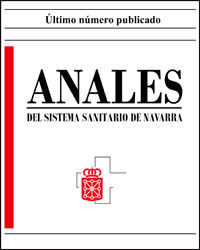Sindrome opsoclono-mioclono-ataxico paraneoplasico
Palabras clave:
Opsoclono. Mioclonias. Ataxia. GanglioneuroblastomaResumen
El síndrome opsoclono-mioclono-atáxico (SOMA) es un trastorno del movimiento muy infrecuente, de origen autoinmune y de aparición a cualquier edad, más probable entre los 6-36 meses. Se presenta el caso de una niña de 30 meses, previamente sana, que presentó progresivamente en los últimos cuatro días marcha inestable, temblor intencional, habla escandida, irritabilidad y trastorno del sueño. El resto de la exploración física y neurológica era normal. Presentó exantema leve tres semanas antes. Al ingreso, la analítica general, cultivos, tóxicos en orina, serologías, electroencefalograma y tomografía cerebral (TC) fueron normales. La punción lumbar mostró linforraquia leve. Al quinto día desde el inicio, la ataxia impedía la sedestación y el temblor era generalizado agravado probablemente por mioclonias intencionales. Aparecieron entonces movimientos oculares rápidos, sacádicos, multidireccionales, aunque conjugados. Ante el diagnóstico de opsoclono, se solicitó radiografía de tórax observando una masa torácica paravertebral, corroborada en la TC torácica. La cirugía confirmó un ganglioneuroblastoma localizado. La enolasa neuronal específica en sangre y catecolaminas en orina fueron normales. El opsoclono desapareció con prednisona oral a altas dosis y tras cirugía. Un año después precisa dosis mínima de corticoide por aparición de leve inestabilidad de la marcha e irritabilidad al suspender la medicación. Conclusiones. El diagnóstico del SOMA es clínico. Su aparición en un paciente con ataxia es un signo de alarma para buscar en todos los casos un posible tumor. El pronóstico oncológico es favorable. Con frecuencia requieren dosis bajas de corticoide a largo plazo por riesgo de recidiva de los síntomas neurológicos, a pesar de la remisión del tumor.Descargas
Descargas
Archivos adicionales
Publicado
Cómo citar
Número
Sección
Licencia
La revista Anales del Sistema Sanitario de Navarra es publicada por el Departamento de Salud del Gobierno de Navarra (España), quien conserva los derechos patrimoniales (copyright ) sobre el artículo publicado y favorece y permite la difusión del mismo bajo licencia Creative Commons Reconocimiento-CompartirIgual 4.0 Internacional (CC BY-SA 4.0). Esta licencia permite copiar, usar, difundir, transmitir y exponer públicamente el artículo, siempre que siempre que se cite la autoría y la publicación inicial en Anales del Sistema Sanitario de Navarra, y se distinga la existencia de esta licencia de uso.








